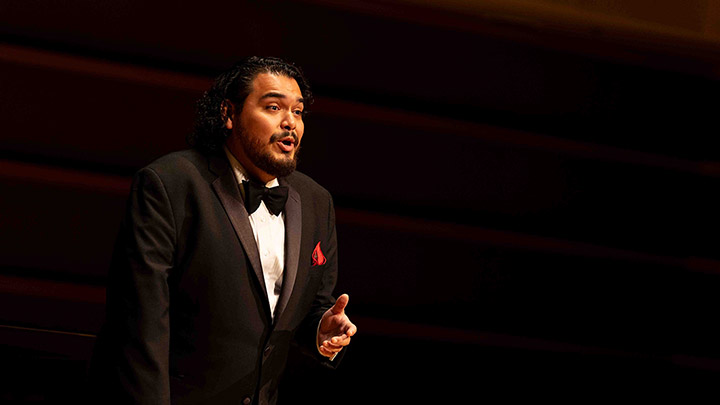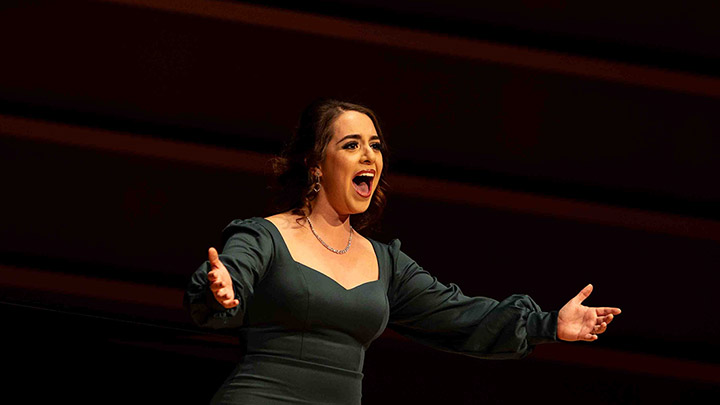
My own attendance goes back to the early 2000s, and the winners have included a handful of fast-rising stars, including in a very strong three-year span: Stephen Costello (2005), Joyce El-Khoury (2006), and Angela Meade (2007).
Did lightning strike again this time? Probably too soon to predict, but it was a strong showing—strong enough that the judges (who, to my delight, included Diana Soviero, a longtime love of mine during her New York City Opera das) decided on the spur of the moment to add an additional prize.
If you’re keeping score, that means: 12 singers; four winners (first, second, and third prize—along with an audience favorite); and, from yours truly, one quibble.
Here are the headlines:
The Winners
- Angel Raii Gómez. This was a double-win for the lyric tenor from McAllen, Texas: both the audience favorite (which he also won last year), and first prize. Neither was a surprise. His two solos—“A te, o cara”, and “Asile héréditaire—showcased his thrillingly free top notes as well as the kind of liquid Mediterranean beauty of tone that spells a star. Gómez also has a charmingly open personality that pours out even in a recital context.
- Luke Norvell. Second prize went to another tenor, in this case a voice more in the spinto mold. The first aria, a relatively rarity in the competition world, was “Anch’io vorrei dormir cosi” from L’Arlesiana; the second, Romeo’s “Ah! leve-toi soleil” was more central. In both, Norvell was notable for dramatic intensity and evenness of line, along with a big-house sense of amplitude. I’d have liked more head voice in the Gounod, but he’s a dramatic and exciting singer.
- Ethel Trujillo. Third prize to this singer whom I’ve had my eye on for a while. She’s a lyric soprano with a very easy top range—up to E flat at least—and considerable musicality across a wide range of styles. Here, she offered “Prendi, per me se libero”—lovely, but not particularly special. But her second aria, Juliette’s “Amour, ranime mon courage” really clinched it; she’s also an intense and responsive actress with a wonderfully mobile face.
I can’t argue with any of these choices, but there were some other singers I think deserve mention.
Two to Watch in the Future
- Jenny Anne Flory. Nominally a mezzo, though I wonder: Flory certainly has color and power in the lower range, but the tone is notably soprano-ish. Either way, she’s a refined singer with fine sense of line, which showed in both “Faites-lui mes aveux” and particularly in “Se Romeo t’uccise un figlio,” the latter dispatched with immaculate precision and brio.
- Matthew Goodheart. This tenor is a second-year artist, and I think clearly still developing. In both “Questa o quella” and “Si ritrovarla io guiro” from La Cenerentola, there were passages that needed more polish. But—his middle register, especially at mezzo-piano, is astonishingly beautiful; one could hear the audience catch its collective breath at moments.
And finally…
DF’s Quibble
- Benjamin Dickerson. This baritone placed second in last year’s Giargiaris. At that time, I wrote about him that “He impresses especially as an artist with fastidious taste and elegance; he reminded me instantly of Sanford Sylvan, a favorite singer of mine—and as with Sylvan, I can imagine that Dickerson will make a major career in concert music as well as opera.” If anything, I thought his showing this time—with Onegin’s Act I aria, and later Hamlet’s “O vin, dissipe la tristesse” was even stronger. Yet he failed to place this year. His presence and style aren’t the showboating sort, which may hamper his chances in this kind of competition setting. But I think time will confirm my belief that Dickerson is a first-tier artist, whose career will make AVA proud.
Photos: Morgan Horell



























Comments